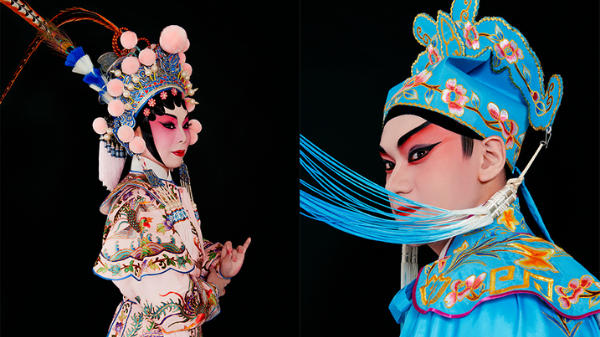Arguably one of the few artforms to spring fully-formed from Hong Kong, Cantonese Opera is a wholly theatrical experience comprising equal parts singing, acting and martial arts. One of the many sub-categories of xiqu (Chinese opera), it also boldly integrates an array of elaborate costumes, exotic make-up and exaggerated facial expressions that all play a part in interpret themes of classical Chinese history and folklore.
Transcendentally popular for generations, the last half-century or so has not been kind, with it gradually fading from public acclaim. Of late, however, there have been signs of something of an uptick in its fortunes. Whether this is a blip in its continued decline or the beginning of a more sustained renaissance is, of course, debatable.

From the late ’60s on, however, the continuing rise of the film industry more or less eclipsed Cantonese Opera. With showing movies proving more profitable and less logistically challenging than staging performances, the city’s local opera sector became increasingly marginalised. Adding to its woes, as real estate values soared, several well-established performance spaces, including the Prince’s Theatre and the Ko Shing Theatre were demolished prior to being developed.
It was a process that continued well up to the end of the millennium. In 1998, for instance, the city’s oldest surviving opera house – the ’30s-built Yau Ma Tei Theatre – closed its doors for the last time. This left the Sunbeam Theatre as the artform’s only remaining venue. Although, in 2009, UNESCO designated Cantonese Opera as part of China’s intangible Cultural Heritage, the move came too late for many of its historical locales and its once mighty troupes.

This honorific, however, did come at a time when there were signs of something of a rebirth. Indeed, in 2012, the Yau Mau Tei theatre reopened as the first new Cantonese opera venue for several generations. Seven years later, it was joined by the government-funded Xiqu Centre in Tsim Sha Tsui and all the signs were this legendary artform might be heading back into favour – and not just among the more nostalgic, older city dwellers.
In fact, contrary to popular belief, Cantonese Opera has never just been aimed squarely at elderly aficionados. Underlining this, a number of local educational bodies, notably the D. H. Chen Foundation, have bankrolled such initiatives as the Cha Duk Chang Children’s Cantonese Opera Association in the hope of nurturing a new generation of theatregoers and performers.

In perhaps the most positive sign of affirmation, in 2009, Cantonese opera became a compulsory part of the music syllabus in all primary and secondary schools across Hong Kong. Later, in 2018, as sign of its incorporation into the digital age, online viewing of contemporary performance became widely available for free through various local government websites. Despite such positive moves, the battle to restore Cantonese Opera’s cultural ascendancy is far from over. In many ways, the biggest challenge is to convince up and coming generations that it remains both vibrant and, most of all, relevant to them.

In the case of 27-year-old Christie To Wing-sum, a professional member of the Tea House Rising Stars Troupe, she has been appearing in Cantonese operas since she turned four. Assessing how the artform is currently perceived, she says: “While Cantonese operas don’t seem to resonate with many local teenagers, some of whom seem to find it old fashioned, a lot of my friends have come to see me perform and have become increasingly open to it.”
“From the late ’60s, the rise of the film industry more or less eclipsed Cantonese Opera”
However, gaining the youth’s attention is not the only obstacle standing in the way of this Cantonese artform’s revival. According to the West Kowloon Cultural District Authority, its long hiatus has also resulted in a shortage of new products, musical arrangements and a limited pool of suitably accomplished performers.
The latter problem partly derives from the long and arduous training process involved, which requires both strenuous vocal coaching and a strict physical regime. Expanding upon the particular challenges, To says: “Most of the Cantonese opera actors in Hong Kong are only ever employed on a freelance basis, making it difficult, in terms of both time and budgetary constraints, to maintain a regular training schedule. The majority also have to prepare their own costumes, which is, again, prohibitively expensive.”

Naomi Chung, Head of Xiqu for the West Kowloon Cultural District Authority, is, however, confident that all such difficulties can be overcome, saying “Cantonese Opera has always been self-reliant and will never stop evolving. It’s market driven and it always finds an audience.”
In order to help find just such an audience, the Authority is currently hosting free Cantonese Opera-related programmes at its dedicated Xiqu Centre, as well as staging contemporary interpretations of classic works. In particular, this has been channeled through two particular programmes – the Tea House Theatre Experience and the Experimental Chinese Opera Festival – both primarily intended to popularise Cantonese opera among up and coming generations.
In the case of the former, this majors on nurturing local young actors and crew members and attracting a new generation of theatregoers, with martial arts performances incorporated for that particular purpose. In the case of the latter, this focuses more on cultivating new productions and playwrights in order to better serve a wider demographic of attendees than are traditionally drawn to xiqu events.








